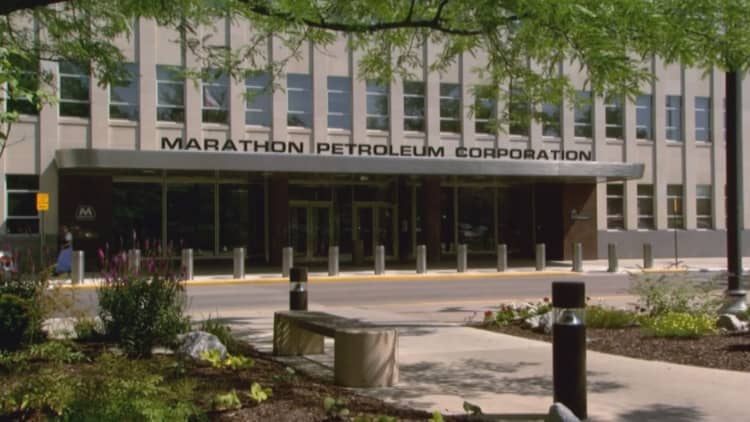A planned merger to form the nation's biggest independent oil refiner stands to capitalize on some of the biggest trends in the energy industry.
Marathon Petroleum's proposed $23 billion purchase of Andeavor would make the combined company one of the biggest operators of U.S. gas station convenience stores. It would also assemble a portfolio of refining assets that stretches from the West Coast to the Midwest at a time when profit margins for refiners are booming.
But the deal also gives Marathon access to infrastructure in the nation's hottest oil-producing region and expands its presence in Mexico, where U.S. energy exports have surged in recent years.The combined company will also be in a better position to produce fuel for the shipping industry just as new emissions rules for seaborne vessels take effect.
Marathon's Permian play
While Marathon's refineries and transportation infrastructure are focused around the Gulf Coast and Midwest, Andeavor's assets are spread around the Western United States.
Crucially, Andeavor is positioned in the Permian Basin, the epicenter of the U.S. drilling rebound in western Texas and New Mexico.

Andeavor operates gathering facilities in West Texas and has a 25-percent stake in a new pipeline called Gray Oak that will transport crude oil across the state to the Gulf Coast refining hub. That gives Marathon's refinery in Galveston Bay, one of the nation's largest, access to cheap oil from the region.
Andeavor and Marathon's Texas assets, source: Marathon Petroleum
Andeavor's constellation of gathering facilities in West Texas creates a launchpad for future pipelines from the Permian, where the surge in drilling activity is setting up a shortage of transportation capacity, according to Raymond James analysts.
The combined company "is set to have a premier set of logistics and refining offerings around the Permian basin, which, in our view, should provide a solid runway for attractive growth over the coming years," Raymond James said in a research note.
Tackling Mexico on two fronts
Recent reforms in Mexico have opened access to the nation's gasoline and diesel market to foreign firms, and a combined Marathon and Andeavor would have a strong position on both coasts of the country.
U.S. gasoline exports to Mexico surged nearly five-fold over the last decade, as Mexico's aging domestic refineries struggled to meet the nation's demand for fuel.
Last year, Andeavor opened its first Arco brand gas stations in Northwestern Mexico, and plans to expand to 200 to 400 stations in the states of Baja California and Sonora. Also in 2017, it became the first U.S. refiner approved to use pipelines and storage owned by state oil company Pemex, which it can use to import fuel into the country's west coast.
Meanwhile, Marathon is one of the biggest suppliers of fuels into the east coast of Mexico. The company ships fuel from its Gulf Coast refineries at Galveston Bay and Garyvillle, Louisiana. It also has the ability to send fuel over the border by rail from Houston.
Andeavor and Marathon's Mexico positions, source: Marathon Petroleum
The companies haven't decided how or if they'll link up their east and west coast positions, but said they will evaluate how they can build out the industry in Mexico over the long term.
Preparing for a sea change
Analysts say the merger also prepares the companies for a coming sea change in shipping.
In 2020, the International Maritime Organization will enforce new emissions standards that will require ships to either install equipment to scrub pollutants from engines that burn high-sulfur fuel or use cleaner-burning low-sulfur fuel.
Right now, few ships have invested in the scrubbers, so many industry-watchers believe companies like Marathon and Andeavor are investing in capacity to make low-sulfur fuel.
"Their refining system is constructed to upgrade high-sulfur crude, especially the bottom of the barrel, into higher-value, low-sulfur fuel, such as diesel fuel," said Andy Lipow, president of Lipow Oil Associates. "So if the price of high-sulfur crude goes down, and you've got equipment to upgrade it, you stand to benefit."
To be sure, competitors like Valero and Phillips 66 stand to capture some of the gains from the changes, but a combined Marathon and Andeavor will have the highest capacity to make low-sulfur fuels, according to the companies' analysis.


